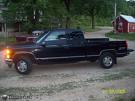Secrets of a happy Cash for Clunkers experience

Thanks to the Cash for Clunkers program, it looks like American auto buying habits are changing for the better. One dynamic is that it's back to the future for full-sized pickups: people who will buy them are likely to be those who truly need them in their job just like it used to be. Bye, bye family pickup.
Why? Fuel economy has barely budged in 10 years unless you pay a king's ransom for a hybrid.
Americans are trading in American pickups and SUVs for compacts and mid-size sedans from Toyota, Ford and Honda. Formally named the Cars Allowance Rebate System, Cash for Clunkers transactions are averaging an increase of 9.6 miles per gallon (MPG), according the National Highway Safety Transportation Administration as cited in Time magazine.
Autobytel reports that based on the use of its evaluation tool -- many sites have them to determine if you qualify and for what -- the most interest has come from owners of pickups and SUVs owners from model years 1997-99.
Hey, that's me! My 1997 C1500 Chevy Silverado which is in great condition with a mere 90,000 miles on the odometer ranks third on Autobytel's trade-in popularity list. Everything works. Tires are good. It has a new battery and only a little rust on the rear bumper. I like this truck and the idea of junking it makes me slightly sick (our main use vehicles are a Hyundai Elantra sub-compact and an Acura TSX compact - both high MPG vehicles by any measure. I put under 5,000 miles a year on the truck which I grant you is an indulgence).

I've done some research to see how well I'd do with a new Chevy Silverado and it's a joke. The CARS site calculator tells me my 1997 Silverado 4WD pickup with a 5.7 liter V-8 and gets combined city and highway 14 MPG. A 2010 SIlverado with a 6-cylinder engine gets a combined 15 MPG. I'd get the $3,500 trade-in allowance and almost no improvement in mileage. If I sold the `97 myself, I'd probably get more than that although it's hard to gauge the impact of Cash for Clunkers on straight-up trade-ins or private sale prices.
It's much the same with other full-size pickups from Toyota and Ford although some get up to 16 MPG whose 2 MPG improvement qualifies for the full $4,500 allowance. Chevy has some full-size hybrid pickup models with up 22 MPG, but they cost between $38,000 and $47,000 which is way more than I want to spend.
If I resort to clunkering before the program expires Nov. 1, I will probably downsize to a small SUV with all- wheel drive given I live in snow country. There's no way I'd buy something new that gets less than 26-27 MPG highway. Buying a new vehicle remains a dubious proposition given steep new car depreciation, the eventual arrival of more efficient and cheaper electrics and the fact a good 2-3 year-old vehicle can make better economic sense especially if driving it into the ground is your strategy (maybe you'll catch Clunkers III with it).
Finally, I found some good `clunkering' advice from Detroit News columnist Brian O'Connor. The following is a combination of his and mine.
--A Clunkers car is going to be junked so take anything you can use with you including spare tire, GPS, stereo. Consider swapping out good tires for ones that can just get it to your dealer. Same with the battery. And make sure the gas gauge is as close to "empty" as possible.
-- Watch for scams. All dealer rebates still apply in addiiton to the federal allowance. Also, don't sign anything to the effect you will pay the rebate amount to the dealer if the government doesn't. That's not allowed and the dealer can be fined up to $15,000 for adding such clauses. What's more, bogus web sites asking for personal information have cropped up. A Cash for Clunkers transaction is strictly between you and the dealer.
-- Make sure the economics of the deal work. Be patient. Don't trade in a vehicle with a book value of $7,000 for the $4,500 allowance just because it's easier than selling it yourself. Used cars are in demand right now so you can get top dollar although so-called book values tend to be high, I have found. And here in Massachusetts, the sales tax just went from 5 per cent to 6.25 per cent, which makes buying a new car about 1.25 per cent less worth it.
As columnist O'Connor says, "Happy Clunkering."
Follow me on Twitter.
This post was originally published on Smartplanet.com